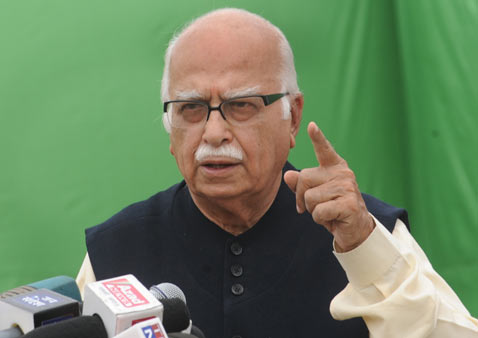NEW DELHI, (Reuters) – Veteran Indian politician Lal Krishna Advani resigned today from top positions in the main opposition party a day after the selection of a controversial leader to head its election campaign exposed deep rifts in the party.
The Hindu-nationalist Bharatiya Janata Party (BJP) has been crippled by infighting among leaders, with several, including Advani, harbouring ambitions to become India’s next prime minister.
But analysts say the party is in such disarray it will struggle to seize back power from the ruling Congress party, even though the latter is beset by corruption scandals and accusations of poor economic management.
“For some time I have been finding it difficult to reconcile either with the current functioning of the party, or the direction in which it is going,” Advani wrote in his surprise resignation letter seen by Reuters.

On Sunday, senior party member Narendra Modi, long seen as a possible prime minister, was selected to head the opposition’s campaign in the coming election, due by May 2014.
Advani, 85, was widely seen as the biggest internal obstacle to Modi’s ambition to become prime minister if the BJP were to win the polls.
But many within the BJP fear that Modi is too divisive a figure to be the face of the party’s national election campaign and will polarise voters, further undercutting the party’s weak electoral position in many states.
Party leaders rushed to Advani’s house in a bid to change his mind, opening the possibility that he may only return to the leadership after extracting concessions. BJP President Rajnath Singh said on Twitter he did not accept the resignation letter.
SUSPICION
Modi is viewed with deep suspicion among India’s large Muslim minority and others who say he did not do enough to stop religious riots in 2002 that killed at least 1,000 people – most of them Muslims – in the western state of Gujarat, where he is chief minister. Modi has denied any wrongdoing in the riots.
Modi’s supporters say he is a no-nonsense administrator who has won praise from major Indian and foreign companies for making Gujarat a business-friendly state. They say he can deliver growth and development at a time when India’s economic growth has slowed to a decade low.
Despite his age, Advani, the BJP’s prime ministerial candidate in 2009, wanted another run at the top job, according to media reports.
He has spent the past months trying, unsuccessfully, to slow Modi’s ascent within the party’s main decision-making committees.
Pralay Kanungo, a politics professor at Jawaharlal Nehru University in Delhi, said Advani’s resignation could deepen the rifts within the party’s leadership.
Advani, seen as the elder statesman of the party, retained considerable influence within the BJP, particularly among mid-level leaders, and “could now have more freedom to attack Modi”.
Advani is himself a controversial figure.
He led a campaign for the construction of a Hindu temple on the site of a mosque in Ayodhya in northern India. The campaign culminated in the razing of the mosque in 1992, triggering nationwide riots in which more than 3,000 died.
